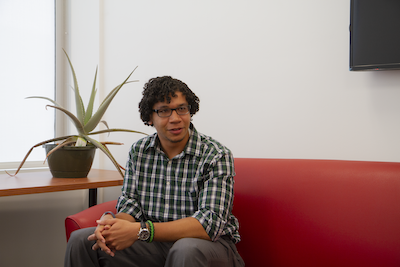Center for Assessment and Psychological Services offers specialized training and services

Located in a discrete multi-room suite in the College of Humanities and Behavioral Sciences Psychology Department, the Center for Assessment and Psychological Services (CAPS) offers advanced clinical training opportunities for psychology graduate students, while also providing Radford University and local communities with quality, evidenced-based comprehensive psychological assessment, consultation, outreach and mental health services.
The venture started about 10 years ago as a way to enhance the graduate-level counseling psychology and school psychology clinical training while providing essential services to the local community and Radford University students. Director Jennifer Mabry has grown CAPS by adding a co-director, Ruth Riding-Malon, and an associate director, Emily Dove; all three are licensed psychology faculty that also teach graduate level courses.
CAPS has a variety of technological systems designed to enhance student learning objectives and improve the quality of the services provided. Video systems monitor sessions so that licensed faculty supervisors can watch live or recorded sessions. A bug-in-the-ear device, a small, wireless one-way communication instrument similar to that used in television broadcasts, allow the supervisors to communicate privately with a student when watching live sessions from an observation room.
“For school psychology students, their work in CAPS is often the next step before they are completely independent, and they move into their school-based practicum,” Dove said. “The video system and technology in CAPS is really helpful because we can provide support and feedback in real time.”
Mabry said, “Because we are able to directly observe [the students] and provide detailed supervision feedback, they feel more confident and prepared [when they go into the field] for external practicums and internships.”
“Their experiences with neurodevelopmental disorder evaluations provide them with pediatric case studies, outside of the classroom, to illustrate the overlap between DSM-5 diagnosis and special education classification,” Mabry continued.
The assessment, therapy and outreach experiences that students have in CAPS have led them to continue providing services at CAPS beyond their coursework because they can see the value in serving a broader range of clients and various ages groups.
“It supplements their school practice,” Dove said. “They enjoy coming back and continuing to see the type of clients that we often attract here at the clinic. Until they’ve left campus, most of the students still work with CAPS in some manner. I think it is a testament to the experiences they are having here.”
Another benefit to CAPS is the increased case consultation feedback students receive from the supervision team of Dove, Mabry and Riding-Malon. Students are able to see how each professor interprets data based on each professor’s specialization. The nature of CAPS also helps students understand the importance of collaboration in psychology and integrated mental health settings.
Riding-Malon said, “Learning to rely on the network that exists and building your network is…very important.”
“Therapy is a great way that we are collaborating in terms of thinking about how to help a client move forward, identify concerns and then design that therapeutic intervention and that works really well with our different backgrounds,” Dove said.
Because of the advanced clinical training opportunities graduate students have had serving community clients, college students, parents and pediatric clients, students have earned internships or job offers based on working in CAPS, which provides transformative educational experiences for graduate psychology students.
“We’re able to offer some unique experience here at the clinic that they may not be able to get outside of the clinic,” Dove said. “We make sure that they have the skills that are transferrable to other techniques, skills, settings or services they will use in the future.”